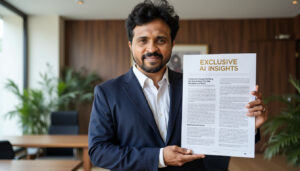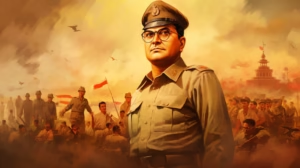I want to take you on a journey of a man through his agonising struggle, pain, fear, failure and eventual triumph, a man who may have been misunderstood by many (including me) until I studied him as a prospect for my next impossible story. I hope this real story of his may change your mind not just about him but also what could be possible for us if we can apply the three lessons from his story.
So, Lets GO!
Munawar Faruqui’s childhood was a life full of struggle and resilience, start in the backdrop of Junagadh, Gujarat. Born into a modest Gujarati Muslim family, Faruqui experienced the ebb and flow of financial stability from an early age.
While his infancy was cloaked in comfort and security, the tides soon turned, plunging his family into the depths of uncertainty. As the shadows of financial constraints loomed large, Faruqui’s childhood morphed into a battleground, where the absence of abundance became a stark reality. The inability to afford school fees became a recurring theme, casting a shadow over his academic journey and leaving an indelible mark on his young psyche.
Deep Tragedy & Biggest Regret
Like many, Munawar Faruqui’s mother was his hero. Faruqui’s mother played a pivotal role at home, serving as the family’s foundation’s bedrock. Despite the challenges of meagre earnings from small jobs and the painstaking creation of food items like papad, she navigated the household with unwavering determination and resilience. Yet, Faruqui’s mother routinely bore the brunt of unwarranted blame from within the family, compounding her burdens and adding to her anguish.
Beneath her stoic exterior lay a heart of gold, brimming with compassion and empathy for those around her. Faruqui’s mother possessed an innate generosity that knew no bounds, readily extending a helping hand to neighbours in need and brightening the lives of others with her selfless acts of kindness.
However, financial strains weighed heavily on the family, prompting Faruqui’s mother to take a credit of Rs. 3500 to alleviate their burdens. Yet, this act only caused further distress as relentless creditors besieged their homes, demanding interest payments and exacerbating their financial woes.
Amidst the pain and turmoil, Faruqui’s mother was driven to desperation. One fateful morning, he discovered her writhing in agony from severe stomach pain. She was rushed to a nearby hospital and then transferred to a larger facility, the family remained tight-lipped, withholding crucial information from bewildered doctors attempting to save her life.
As young Faruqui frantically searched for answers, his heart ached with the desire to save his beloved mother. Yet, he found himself engulfed in a sea of confusion, unaware of the true nature of her condition. It wasn’t until one of the aunts took him aside and revealed the unthinkable truth: his mother had ingested acid. Despite the doctors’ valiant efforts, her life slipped away, leaving Faruqui and his family shattered and bereft of answers.
“Many reasons made my mom take the drastic step and money could be one reason. Today whatever I earn, I will always regret that I did not have Rs.3500 with me that day and I could not save my mom.”
– A crying Faruqui told in one of his Reality TV Show.
He had many turning points in his career. However, let us look at 3 of them and derive some lessons from it for our own journeys and pursuits.
The First Turning Point: The Move to Mumbai
Munawar’s life takes a huge turn when his mother’s death compelled him to relocate to Dongri, Mumbai, at the invitation of his aunt. The neighbourhood, infamous for its association with crime, was once home to dons and mafia lords, including former Mumbai underworld don Dawood Ibrahim. With no familial support, Faruqui embarked on a journey of survival, undertaking a myriad of odd jobs to eke out a meagre existence in the bustling metropolis. Starting from the humble sum of Rs 60 per day, he found himself relegated to menial tasks at a utensil shop, tasked with the arduous duties of cleaning and serving tea to patrons.
Compounding the challenges of his circumstances was the abrupt cessation of Faruqui’s formal education, forced upon him by the dire financial straits that plagued his family. With determination to learn again, he immersed himself in newspapers and English songs in a valiant effort to reclaim the education that had been denied to him.
He then ventured into comedy. Faruqui’s stage persona often mirrored that of a disinterested college student with a penchant for dark humour. His performances ranged from playful indifference to cool detachment, weaving macabre jokes about surviving riots and satirizing stereotypes about Muslims. While he occasionally struggled with consistency, Faruqui could captivate audiences with his provocative humour, simultaneously amusing and unsettling them. This same flair for evoking conflicting emotions permeated his rap music, which he pursued alongside his comedy career.
“I evoke my past to express how proud I feel about my growth. It’s never for sympathy but just to tell people I have come this far.”
– Faruqui, reflecting on his journey.
The Second Turning Point: Becoming Controversial
Faruqui’s rise in the comedy scene was marked by both acclaim and controversy. In 2021, during a 14-city tour that kicked off in Indore, he found himself embroiled in a legal battle after being accused of insulting Hindu religious sentiments by a local Hindu hardline group.
Despite protests, eyewitnesses attested that Faruqui hadn’t made any religiously offensive jokes during the show in question. Nonetheless, he spent 35 days in jail which was a harrowing experience for Faruqui. He had to grapple with a whirlwind of emotions and a profound sense of disorientation. Cut off from the outside world, the stark reality of prison life, its food became apparent, resembling a living hell where one’s very existence felt compromised.
Upon his return to comedy, Faruqui faced further adversity as numerous shows were cancelled due to pressure from Hindu groups. Ultimately, in December 2021, he announced his decision to step away from comedy, lamenting the pervasive hate and intolerance that had marred his artistic endeavours.
“Hate has won, artist has lost. I’m done,”
– Faruqui wrote in an Instagram post.
The Third & Biggest Turning Point: Pivoting to Reality TV
Two months later, Faruqui took a bold step forward by joining the cast of a reality TV show known as Lock Up, viewing it as an opportunity to revamp his public image and distance himself from previous controversies. He expressed his intention to steer clear of further entanglements in contentious issues, emphasising his initial contentment with his career trajectory in comedy. However, Lock Up presented an unconventional premise, featuring 16 controversial celebrities confined to a boisterous simulated jail environment for 72 days, with the show being helmed by Kangana Ranaut, a prominent Bollywood actor.
Transitioning from his acclaimed stand-up routines, Faruqui underwent a notable shift in his public persona for the televised platform. While his comedy acts often delved into dark humour laced with political commentary, on Lock Up, he adopted a more deliberate and self-aware approach, consciously avoiding topics related to religion and identity. The focus shifted towards personal narratives and interpersonal drama, with Faruqui candidly discussing his experiences of being trapped in a loveless marriage and navigating fatherhood. This newfound vulnerability and authenticity resonated with audiences who had previously been critical of him, earning him praise even from Ranaut, the show’s host. After 70 episodes, Faruqui emerged triumphant, signalling a turning point in his career trajectory.
Faruqui’s Biggest Success Yet!
Following his triumph on Lock Up, Faruqui’s comedic prowess continued to captivate audiences across India, transcending the confines of the television screen. His wit and humour resonated with millions of viewers who tuned in to watch The Bigg Boss, where 21 contestants were isolated in a custom-built house, filmed around the clock, and subject to weekly audience votes for eviction.
At the Bigg Boss house, Faruqui’s charismatic demeanour and sharp wit endeared him to audiences until the very conclusion of the show. His non-confrontational attitude, coupled with his penchant for cheeky comebacks and flirtatious poetry, kept viewers entertained and engaged throughout his tenure on the reality program.
Faruqui’s journey from incarceration to reality TV stardom serves as a testament to his resilience and ability to defy simplistic categorisations. As he navigates the complexities of fame and fortune, Faruqui emerges as a symbol of hope and inspiration for audiences, transcending the limitations of his past experiences to embody the spirit of perseverance and redemption.
The victory on Lock Up and Big Boss injected renewed vigour into Faruqui’s creative pursuits. He resumed his endeavours in rap music, amassing a significant following on popular streaming platforms like Spotify and YouTube. Additionally, he reestablished his presence on social media platforms, including Instagram, and eventually made a triumphant return to the comedy circuit. Each public appearance and statement sparked enthusiasm among his devoted fan base, heralding a promising new phase in Faruqui’s professional journey.
Lessons for Us
Munawar Faruqui’s journey is a poignant example of the type of remarkable stories we seek to uncover in the Impossible newsletter. Our mission is to unearth narratives of individuals who have defied the odds, surmounted seemingly insurmountable obstacles, and achieved extraordinary feats. Faruqui’s story resonates deeply with this theme as he navigates through adversity, emerging victorious against all odds.
So, What can we take home from Faruqui’s incredible journey that can help us achieve our goals that seem impossible today?
1. Always Back Yourself to Win: Despite facing setbacks, including financial struggles and legal troubles, Faruqui’s unwavering belief in his abilities propelled him to success in reality television shows like Lockup and Bigg Boss. His story is a reminder that with confidence and perseverance, one can overcome challenges to achieve success.
2. Your Struggle is Your USP: Faruqui’s tumultuous journey, marked by controversies and jail time, became the cornerstone of his success. Rather than letting his adversities define him, he embraced his struggles, using them to his advantage. By confronting controversy and channelling his experiences into his comedy, he set himself apart, earning recognition and fame. His story highlights the power of embracing struggles as a unique selling point (USP) to carve out a distinct identity.
3. Any change can be The turning point: Faruqui’s story emphasizes the importance of embracing change for personal and professional growth. Whether relocating to Mumbai after his mother’s death or pivoting from comedy to reality television, he embraced change as a means of reinvention. His ability to adapt and strive for change enabled him to navigate adversity and emerge stronger. His journey serves as a testament to the transformative power of embracing change for growth and advancement.



